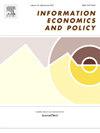世界各地的人们关心他们的数据存储在哪里吗?
IF 3.2
3区 经济学
Q1 ECONOMICS
引用次数: 0
摘要
通过精心设计的离散选择调查,我们衡量了个人对他们的数据是否存储在国内的关心程度,也就是说,与其他地方相比,人们对限制将数据共享到本国的重视程度。我们在不同国家(美国、英国、韩国、日本、意大利、印度和法国)和数据类型(家庭住址和电话号码、个人财务信息、生物识别技术、健康状况、位置、网络、通信和音乐偏好)之间进行此测量。我们只发现了数据本地化带来附加值的适度证据;就本地化带来的附加价值而言,它似乎主要来自隐私(即对数据共享的全面限制)已经具有很高价值的数据类型:金融(账户余额)和生物识别(面部图像)数据,以及家庭地址和电话号码。我们还发现,对于美国、英国、意大利、印度和法国,没有证据表明在允许国际数据共享时排除中国和俄罗斯会影响数据本地化溢价。有趣的是,对于日本和韩国,我们发现,如果要在国际上共享数据,它们倾向于不把中国和俄罗斯排除在外。我们将讨论隐私政策的含义。本文章由计算机程序翻译,如有差异,请以英文原文为准。
Do people around the world care where their data are stored?
Using carefully designed discrete choice surveys, we measure how much individuals care whether their data are stored domestically, i.e., the premium people place on limiting the sharing of their data to their home country compared to elsewhere. We conduct this measure across countries (United States, United Kingdom, South Korea, Japan, Italy, India, and France) and data types (home address and phone number, personal information on finances, biometrics, health status, location, networks, communications, and music preferences). We find only modest evidence of added value resulting from data localization; to the extent that there is added value from localization, it appears to largely come for data types where privacy (i.e., full restrictions on data sharing) is already of high value: financial (account balance) and biometric (facial image) data, and home address and phone number. We also find for the U.S., U.K., Italy, India and France no evidence that excluding China and Russia when allowing for international data sharing affects the data localization premium. Interestingly, for Japan and South Korea, we find evidence of a preference against excluding China and Russia if data are to be shared internationally. We discuss privacy policy implications.
求助全文
通过发布文献求助,成功后即可免费获取论文全文。
去求助
来源期刊

Information Economics and Policy
ECONOMICS-
CiteScore
5.00
自引率
10.70%
发文量
27
期刊介绍:
IEP is an international journal that aims to publish peer-reviewed policy-oriented research about the production, distribution and use of information, including these subjects: the economics of the telecommunications, mass media, and other information industries, the economics of innovation and intellectual property, the role of information in economic development, and the role of information and information technology in the functioning of markets. The purpose of the journal is to provide an interdisciplinary and international forum for theoretical and empirical research that addresses the needs of other researchers, government, and professionals who are involved in the policy-making process. IEP publishes research papers, short contributions, and surveys.
 求助内容:
求助内容: 应助结果提醒方式:
应助结果提醒方式:


